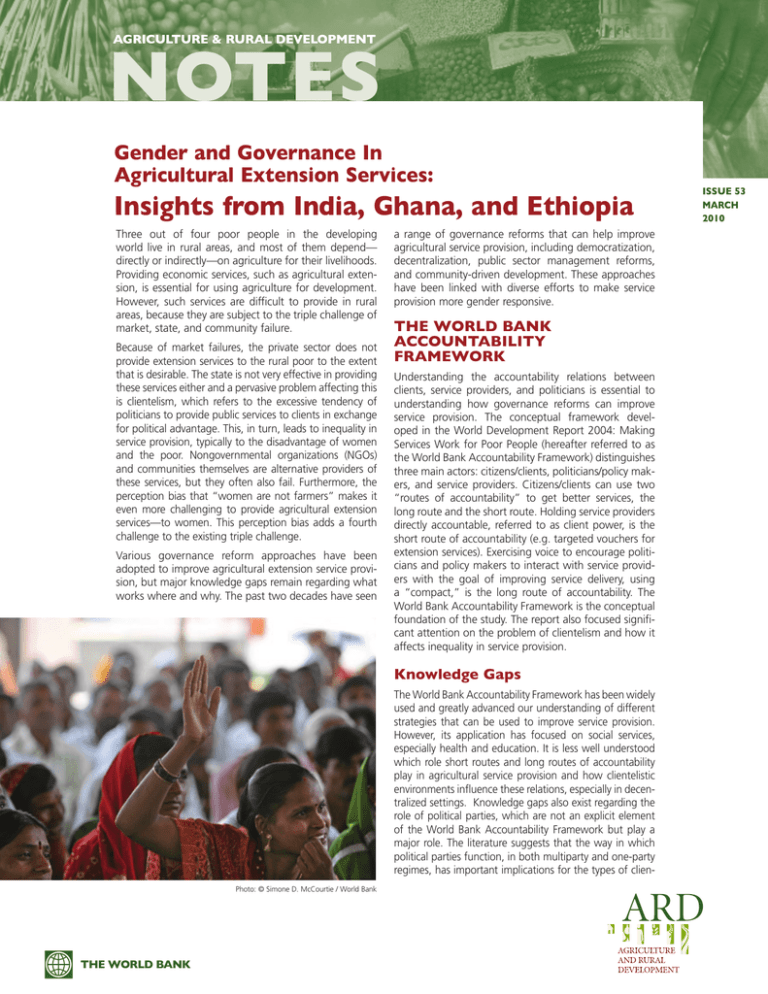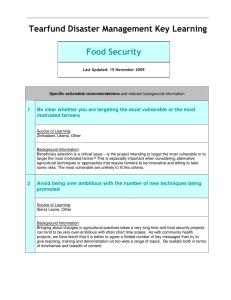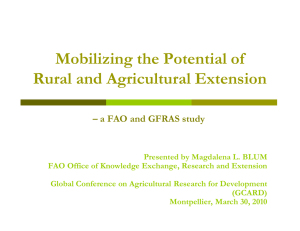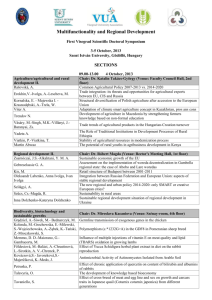NOTES gender and governance in
advertisement

AgriculturE & Rural Development NOTES Gender and Governance In Agricultural Extension Services: Insights from India, Ghana, and Ethiopia Three out of four poor people in the developing world live in rural areas, and most of them depend— directly or indirectly—on agriculture for their livelihoods. Providing economic services, such as agricultural extension, is essential for using agriculture for development. However, such services are difficult to provide in rural areas, because they are subject to the triple challenge of market, state, and community failure. Because of market failures, the private sector does not provide extension services to the rural poor to the extent that is desirable. The state is not very effective in providing these services either and a pervasive problem affecting this is clientelism, which refers to the excessive tendency of politicians to provide public services to clients in exchange for political advantage. This, in turn, leads to inequality in service provision, typically to the disadvantage of women and the poor. Nongovernmental organizations (NGOs) and communities themselves are alternative providers of these services, but they often also fail. Furthermore, the perception bias that “women are not farmers” makes it even more challenging to provide agricultural extension services—to women. This perception bias adds a fourth challenge to the existing triple challenge. Various governance reform approaches have been adopted to improve agricultural extension service provision, but major knowledge gaps remain regarding what works where and why. The past two decades have seen a range of governance reforms that can help improve agricultural service provision, including democratization, decentralization, public sector management reforms, and community-driven development. These approaches have been linked with diverse efforts to make service provision more gender responsive. The World Bank Accountability Framework Understanding the accountability relations between clients, service providers, and politicians is essential to understanding how governance reforms can improve service provision. The conceptual framework developed in the World Development Report 2004: Making Services Work for Poor People (hereafter referred to as the World Bank Accountability Framework) distinguishes three main actors: citizens/clients, politicians/policy makers, and service providers. Citizens/clients can use two “routes of accountability” to get better services, the long route and the short route. Holding service providers directly accountable, referred to as client power, is the short route of accountability (e.g. targeted vouchers for extension services). Exercising voice to encourage politicians and policy makers to interact with service providers with the goal of improving service delivery, using a “compact,” is the long route of accountability. The World Bank Accountability Framework is the conceptual foundation of the study. The report also focused significant attention on the problem of clientelism and how it affects inequality in service provision. Knowledge Gaps The World Bank Accountability Framework has been widely used and greatly advanced our understanding of different strategies that can be used to improve service provision. However, its application has focused on social services, especially health and education. It is less well understood which role short routes and long routes of accountability play in agricultural service provision and how clientelistic environments influence these relations, especially in decentralized settings. Knowledge gaps also exist regarding the role of political parties, which are not an explicit element of the World Bank Accountability Framework but play a major role. The literature suggests that the way in which political parties function, in both multiparty and one-party regimes, has important implications for the types of clienPhoto: © Simone D. McCourtie / World Bank THE WORLD BANK ISSUE 53 MARCH 2010 telism and elite capture that may affect agricultural and rural service provision. Additional knowledge gaps exist with regard to the gender dimension of these routes of accountability. The Gender and Governance Project The Gender and Governance in Rural Services: Insights from India, Ghana, and Ethiopia report aims to generate policy-relevant knowledge on strategies for improving agricultural service delivery, with a focus on providing more equitable access to these services, especially for women. The project has been implemented in India, Ghana, and Ethiopia. These countries were chosen to capture variation in important macrofactors, especially the level of economic development; various aspects of governance, such as political system and party system; the role of women in society; and strategies adopted to promote gender equity. The project focused on agricultural extension as an example of a critical agricultural service. Research Methodology The findings presented in this report are based on quantitative surveys of households, community members, community-based organizations, and service providers and on qualitative case studies. The WDR2004 framework adopted in this report disaggregates and expands the Framework in several ways: • It includes male/female gender signs in all boxes to indicate the gender dimension of all actors involved in service delivery. • It distinguishes between public sector service providers at the local level and the ministries at the national/federal or state level to which the local public sector service providers may belong. • It disaggregates political representatives at different levels of local government and members of parliaments at state and federal levels. • It includes NGOs and private sector organizations that provide services as a separate category. The World Bank Accountability Framework • It includes development agencies and advocacy NGOs as a separate category because they often influence service provision. • It explicitly introduces community-based associations, which may empower citizens to interact more effectively with their political representatives or act as service providers themselves. • It includes political parties, which can play an important role in formulating policies and laws that influence the gender responsiveness of public service provision and in selecting political candidates and at times public officials. Country Specific Recommendations India Address the staff shortage problem: In India, the main problem is the lack of overall capacity resulting from a past policy of not hiring agricultural extension providers. Because of this, there is almost no public capacity left for providing extension, and the private and civil society sectors have not filled that gap. The number of agricultural extension agents can be increased in various ways including, hiring staff on a contract basis for specific programs. This is a more flexible approach, and one that is currently being pursued by the government of Karnataka. Other options include contracting NGOs that work in the agricultural sector, contracting private sector companies that can provide extension services, and establishing public-private partnerships. Before hiring more agricultural extension staff, states should conduct a thorough analysis of the human resources in terms of numbers, qualification, and skill mix required for improving agricultural extension. Provide better services to female farmers: While addressing the staff shortage problem, attention should be given to providing better services to female farmers. In view of the positive experience in other countries (Ghana in particular), the strategy to hire female extension agents to better serve female farmers deserves special attention. The standing committees on agriculture and industry in the district panchayats The Long and Short Routes of Accountability National/state-level Political representatives (NP) National/state-level Ministries (NM) The state Politicians Vo ice e of accounta rout bili ng ty Lo Citizens/clients Coalitions/inclusion Nonpoor Policy makers Short route Client power Poor Political Parties (PP) Co mp ac t Local Political representatives (LP) Long route Providers Management Frontline Community-based Organizations (CO) Organizations Services 2003. World Development Report 2004: Making Services Work for Poor People. Washington, DC: World Bank. 2 Development Agencies/advocacy NGOs (DA) Household Members (HH) Short route Public Sector service providers (PS) NGO/private service providers (NG) Services Adapted from World Bank (2003). Reestablish the function of agricultural extension as a bridge between agricultural research, farmers, and markets. The linkages between agricultural research Access to Agricultural Extension Services by Gender 30% Male 25% Female 20% 15% 10% 5% 0% and extension can be strengthened in various ways. If participatory planning approaches for the introduction of new technologies, commodities, and farming practices are implemented (as piloted by The Agricultural Technology Management [ATMA]), extension agents may have stronger incentives to contact agricultural researchers to meet farmers’ needs. The establishment of governing structures that involve both agricultural researchers and extension agents, as foreseen under ATMA, can also improve the bridging function of agricultural extension. Form functioning farmer-based organizations (FBOs): Ethiopia India Ghana Access to Agricultural Extension Services— Findings in India, Ghana, and Ethiopia Access to extension is moderate in India and Ethiopia and low in Ghana. In Ghana, the gender gap in access to extension is pronounced. Access to extension in Ethiopia varied widely across regions, ranging from 2 percent in Afar to 54 percent in Tigray. Also, a high level of access does not necessarily mean the service is being used or that it is of good quality. The top-down approach and with the focus on getting model farmers to adopt fixed-technology packages, extension tends to neglect poor farmers, particularly women. In addition, the extension system is not client oriented, and users have limited demand capacity. Access to extension was lowest in Ghana. Only about 10–15 percent male-headed households attended group meetings organized by agricultural extension officers, with some variation across agroecological zones. Despite the predominant role of women in Ghanaian agriculture, access of female-headed households to agricultural extension turned out to be very low. could also play a proactive role in mobilizing public awareness for the inclusion of gender issues in plans and policies of decentralized bodies and government departments. Address the management challenges within the public sector: The management challenges, particularly political interference and the low use of merit-based promotion, deserve attention. Both problems are deeply entwined within the general public administration, and cannot be resolved in isolation within the agricultural departments. The hiring of new staff outside the civil service system offers new opportunities for merit-based promotion and other incentive systems, such as merit-based wage compensation. The problem of political interference could be reduced by strengthening the role of agricultural extension staff in improving the knowledge and skill base of the farming population rather than by using extension agents mainly for implementing subsidized input programs. Also, a rightto-information approach could be used to reduce political pressure and elite capture. Extension agents are not only limited in numbers, but they also lack the skills required to form and supervise groups. Furthermore, they tend to work with better-off farmers and male farmers. If the strategy of forming farmers’ interest groups is to be pursued, appropriate investments have to be made in hiring qualified facilitators for group formation and training group representatives. Special attention needs to be paid to making farmers’ interest groups inclusive in terms of gender and caste, something that has proven to be a challenge in the past. Although the best strategy to improve rural service provision will always depend on the specific situation, it may be promising to link agricultural service provision to existing groups. Women’s self-help groups may be an option, especially for livestock-related services. However, these groups should not be over loaded with too many functions. Federations of community-based organizations and agricultural producer companies are other promising options. As group-based approaches place demands on farmers’ time, however, alternatives should be considered. The provision of extension services through Internet kiosks and cell phones deserves attention; further analysis is needed to assess the gender responsiveness of these approaches. Ghana The study indicates that access to agricultural extension is low, despite the fact that an extension agent–to–farmer ratio is comparatively high. The following strategies may be considered to address these challenges: Improve the management of agricultural extension: To improve the focus on agricultural productivity and other outcome-related targets, should be made a part of the extension agents’ agenda. The Ministry of Food and Agriculture could introduce awards for communities and districts that are most successful in increasing agricultural productivity at the community or district level rather than just rewarding individual farmers. Research and extension linkage committees (RELCs) at the district level are supposed to create linkages between research and extension, yet this strategy does not seem to be sufficient. Increasing farmers’ demand for new knowledge—by strengthening participatory extension planning and technology development approaches, for example— may be a useful strategy for creating more incentives for extension agents to channel this demand to the research system. In view of the low percentage of farmers who try new technologies, it also seems useful to devise incentive 3 systems that reward extension agents for the number of male and female farmers who adopt new technologies. It will be useful to critically review past efforts to reform the Ministry of Food and Agriculture and to try reform approaches such as Appreciative Inquiry, which use the best values of an organization as a starting point of reform and rely on internal change agents rather than considering the organization only as a problem that has be resolved (usually by restructuring using external consultants). Ethiopia Increase the access of female farmers to agricultural extension: The following strategies could be explored: technology adoption by more farmers, it seems useful to give extensions agents—together with farmers—more space to experiment with technology and input packages other than those they are currently promoted. Microlevel adaptation of existing packages could make new inputs and practices more credible to farmers. This is particularly important with regard to extension agents’ work with women. • Identify and address the factors that prevent female household members from attending extension-related community meetings, perhaps by organizing such meetings at times and locations that make them more accessible for female household heads. Explore the extent to which the Women in Agricultural Development (WIAD) units have already tried to address these problems, and identify the implementation problems WIAD officers may have faced in this respect. • Increase the share of female extension agents, who were found to be more effective than male extension agents in reaching female farmers. • Create incentives for reaching female farmers by, for example, rewarding such outreach in performance reviews. Prepare extension agents for Local Government Service: One of the planned changes to strengthen the local government system is the introduction of a Local Government Service, a separate category of public officials besides the civil service that could include agricultural extension. It would be useful to proactively use this opportunity for increased accountability and to pilot test approaches by which extension agents, district assembly members, and district assembly staff can work together effectively under this new system. Reconsider the role of FBOs: FBOs have been promoted as a major strategy to deliver agricultural extension services more effectively. Several strategies could be pursued to address the challenges with this strategy that the study identified: • Encourage FBOs to engage in activities that will make them sustainable, such as joint agricultural marketing, agroprocessing, joint purchasing of agricultural inputs, and joint use of agricultural machinery. The experience of projects that already tried this strategy needs to be reviewed. • Analyze the problems women face in joining FBOs. Promote the formation of FBOs made up only of women (an intervention that is already in operation). Agricultural extension is a high government priority, but coverage of extension services across regions varies widely, and extension agents have limited discretion to adapt technology packages to the context of individual communities. The gender gap in access to extension can also be improved. Some approaches to addressing these issues could include the following: Give more discretion to extension agents: To increase Expand extension coverage where it is low, including to pastoral areas: Extension coverage varies widely across sites, with as few as 2 percent and as many as 54 percent of respondents having access to extension agents. Reducing these stark differences in access seems justified. Bridge the gender gap in access to extension services: The study identifies some promising ways to reduce the gender gap. One is the engagement of women’s associations to serve as a bridge between extension workers and women farmers. External assistance may include better and more detailed documentation on how and through which mechanisms women’s associations are successful in bringing extension advice to their members. Lessons learned could be taken into account in expanding and scaling up this approach. Moving Forward The accountability linkages for rural service provision vary widely across countries, depending on the political system and the approach to decentralization in service provision. Understanding these linkages is necessary for identifying entry points to make rural service provision more responsive to gender needs. Many important questions require further research, experimentation, and learning. Which mechanisms in the local governance system create political incentives in obtaining better outcomes for the rural population in general and rural women in particular? How do these mechanisms differ across political systems? Which mechanisms work within a (de facto) one-party system? Which mechanisms work in multiparty systems that are subject to political competition but plagued with clientelism and elite capture? Future research— including research using the data collected under this project—will have to address these questions. 1 International Food Policy Research Institute (IFPRI), Institute of Social and Economic Change (ISEC), Tata Institute of Social Sciences (TISS), Institute of Statistical Social and Economic Research (ISSER) of the University of Ghana, Legon, Ethiopian Economic Policy Research Institute (EEPRI), World Bank. 2010. Agriculture and Rural Development Series: Gender and Governance in Rural Services: Insights from India, Ghana, and Ethiopia, World Bank, Washington, D.C. This ARD Note was prepared by Sonia Madhvani and Eija Pehu of the World Bank and Regina Birner of the International Food Policy Research Institute (IFPRI). It is based on the report Gender and Governance in Rural Services: Insights from India, Ghana, and Ethiopia. THE WORLD BANK 1818 H Street. NW Washington, DC 20433 www.worldbank.org/rural



